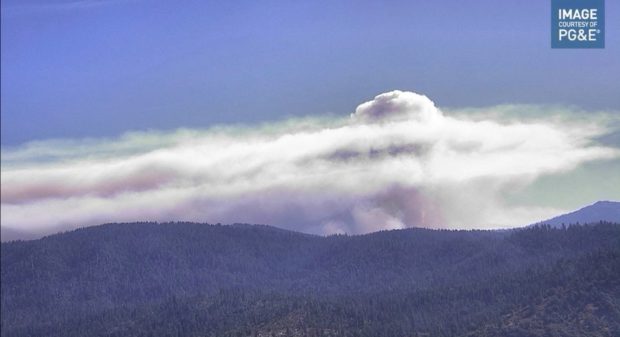
Smoke rises from hills as the Washburn Fire burns near Ahwahnee, California, U.S., July 9, 2022 in this screengrab taken from a handout video. alertwildfire.org/Handout via REUTERS
A wildfire threatening some of the world’s oldest giant sequoia trees in California’s Yosemite National Park expanded five-fold over the weekend as smoke prompted air quality alerts throughout the park and obscured views of its famed scenery.
As of Sunday, the blaze had scorched nearly 1,600 acres (648 hectares) of timber and brush at the southern end of the park, up from 250 acres on Friday, a day after fire was first reported by visitors on the Washburn Trail of the Mariposa Grove of Giant Sequoias.
National Park Service personnel immediately closed the Mariposa Grove, home to more than 500 mature giant sequoias, and on Friday evacuated the adjacent community of Wawona and the Wawona Hotel and campground.
Coming at the height of the summer tourist season, the evacuations displaced an estimated 1,600 people in all, according to Park Service spokesperson Nancy Phillipe. The Park Service also has shut down the southern entrance to the park, which Phillipe said draws about 4 million visitors a year.
The park’s best-known attractions, including Yosemite Valley, remain accessible to visitors from its western entrance. But smoke and soot have dimmed views of landmarks such as the towering granite formations of El Capitan and Half Dome, as well as Bridalveil Fall and surrounding cliffs.
Federal wildfire officials on Sunday warned that air quality for particulate matter had reached unhealthy levels across much of the park.
Visitors check out the view from the east end of the Wawona Tunnel into Yosemite Valley, showing three major landmarks, from the left, El Capitan, Half Dome and Bridalveil Fall, obscured by thick smoke in the area from the wildfire burning to the south in the Mariposa Grove of Giant Sequoias, at Yosemite National Park, California, U.S., July 9, 2022. Courtesy of U.S. National Park Service/Handout via REUTERS
While flames stoked by extremely dry, hot conditions worsening on Sunday have burned largely unchecked, none of Yosemite’s landmark sequoias, some of them over 3,000 years old and given names, has yet been lost, Phillipe said.
Firefighters were taking special measures to protect the grove, clearing away undergrowth that could add to the fuel bed and deploying ground-based sprinkler systems to increase humidity levels around them.
“We’re feeling confident of the plan we have in place today,” Phillipe told Reuters by phone.
No injuries have been reported in the blaze, dubbed the Washburn fire, and its cause remained under investigation.
Giant sequoias, the world’s largest trees by mass and insulated by thick, spongy bark, have coexisted for millennia with lightning-sparked fires considered part of the natural balance of healthy redwood forests. Fire is even vital to reproduction of the trees, whose cones require high heat to crack open and release seeds.
However, experts say drought-stressed sequoias today have grown increasingly vulnerable to more frequent bouts of extreme wildfire activity symptomatic of human-caused climate change.
Hundreds of the trees have perished in six major wildfires that have raged through California’s Sierra Nevada range over the past six years, burning 85% of all giant sequoia groves between 2015 and 2021, compared to only one quarter in the preceding century, according to Park Service.
RELATED STORIES
Lessons from America’s national parks
Indian couple who died in Yosemite took risks for photos
‘Firefall’ phenomenon wows visitors to Yosemite’s El Capitan
US crews battle huge wildfire in Yosemite area